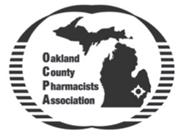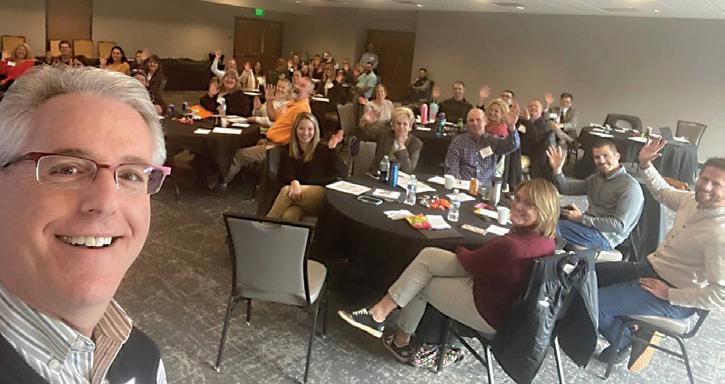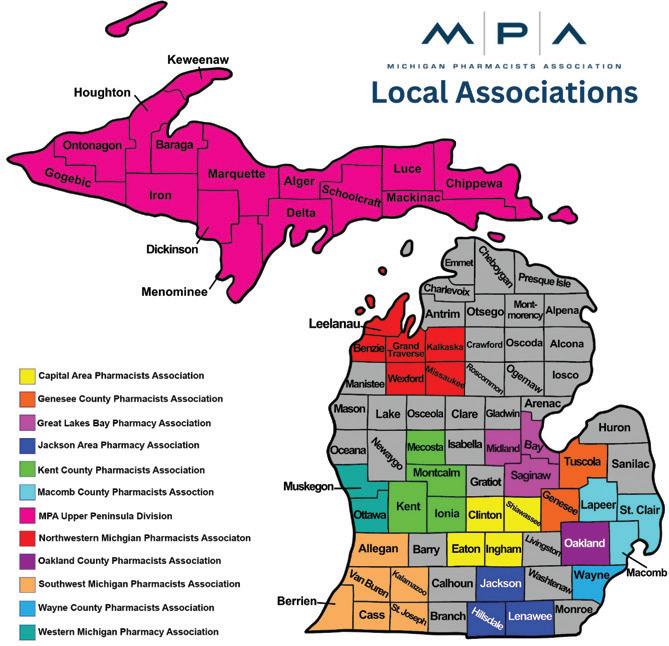





3 President’s Platform
MPA President Sarah Hill encourages you to get involved in an MPA committee today.
23 Professional Affairs
Impact of order set implementation on appropriate treatment of communityacquired pneumonia (CAP).

19
4 CEO Corner
MPA is your voice in affecting positive policy changes for Michigan pharmacists.
27 MSHP President
MSHP President Kyle Schmidt on utilizing essentialism to accomplish important goals.

21
7 CE Calendar
All the latest continuing education offerings from MPA.
31 Student Focus
The benefits of becoming a Michigan Pharmacists Association student member.
Mark Glasper; EDITOR: Ryan Weiss; PUBLISHER: Bryan A. Freeman

BY SARAH HILL, Pharm.D.; president, Michigan Pharmacists Association
"By joining a committee, you can make a meaningful contribution to MPA and the profession. You will help shape the future of our organization and ensure our continued positive impact."
It's that time of year again — your last chance to sign up to serve on one of MPA’s seven standing committees! These committees are integral to the work done by the Michigan Pharmacists Association (MPA). Each committee is assigned specific charges to work on throughout the year, contributing to the association's impact as a whole. My favorite part of committee work is that it provides MPA leadership with invaluable insights into what matters most to our members!
I highly recommend serving on a committee to anyone interested in getting more involved with MPA. Our committees accomplish crucial work for the association while fitting seamlessly into the busy lives of pharmacy professionals. Committees meet virtually and most committees convene only a few times a year, making participation manageable and impactful.
If you're new to taking a leadership role within MPA, committees are an excellent starting point. You'll be guided by the chair of your committee and an MPA staff liaison, who will walk you through the expectations for committee members and demonstrate how your voice is essential to the team. For experienced MPA leaders, committees offer a platform to leverage years of service. You can provide longitudinal perspectives by helping your team envision how ideas generated within the committee might be implemented within MPA. Every level of experience brings something unique and important to the committee table.
I encourage you to reflect on what you are most passionate about in the profession and consider your personal gifts and talents. Perhaps you find the legislative process fascinating or have a knack for strategic marketing. Maybe you love teaching others about your pharmacy niche or excel at articulating the importance of MPA membership. Please share your gifts with us – each voice strengthens our organization!
Education Committee: Collaborates with staff to identify topics and speakers for our numerous educational programs. MPA is the premier provider of pharmacy education in our state and this committee helps to ensure that our education topics remain fresh and relevant.
Government Affairs Committee (GAC): Plays a crucial role in MPA's legislative work. Committee members review proposed legislation and regulatory changes and make recommendations to the Executive Board on how the membership feels about these proposed changes. The GAC also helps support the Political Action Committee (PAC) through fundraising efforts.
Marketing Committee: Serves as a sounding board for new and innovative marketing and communication strategies. Their creative ideas help MPA stay at the forefront of effective outreach and engagement.
Membership Committee: Develops strategies to recruit and retain members. Starting this year, the New Practitioner Committee has been integrated into the Membership Committee to streamline efforts and ensure robust representation of new practitioners.
Professional Affairs Committee: Prepares the National Alliance of State Pharmacy Associations (NASPA) Self-Care Challenge held at the Annual Convention & Exposition (ACE), a fan-favorite event showcasing the exemplary education student pharmacists receive at our state’s three colleges of pharmacy. This committee also identifies authors for articles on patient safety and health equity.
Public Affairs Committee: Promotes a positive public image of the profession and educates the public on the essential work done by pharmacy professionals.
Workplace Environment Committee: Works to advance the pharmacy workplace for the betterment of pharmacy professional wellbeing. This committee researches what can be done and reports findings to leadership.
Joining an MPA committee is a fantastic opportunity, not only for the association, but for you as well. I have found that at each level of my participation — from committees to practice section boards, to the executive board and now as president — my appreciation for MPA’s work has deepened. Serving on a committee will give you a front-row seat to the diligent efforts being made on your behalf. You will also have an opportunity to make new and stronger networking connections and have a chance to flex your leadership muscles!
By joining a committee, you can make a meaningful contribution to MPA and the profession. You will help shape the future of our organization and ensure our continued positive impact. To get started, please take a few minutes to fill out the Membership Engagement Survey. You can find it on the MPA website, simply choose “Committees” from under the Membership heading and look for the hyperlink near the top of the page. I look forward to your involvement and the unique perspectives you will bring to our committees!


BY MARK GLASPER, chief executive officer, Michigan Pharmacists Association
Now more than ever, the Michigan Pharmacists Association (MPA) is your voice in the pharmacy profession. In Lansing, around Michigan and even in the nation’s capital, MPA works tirelessly to collaborate with legislators, regulators and our friends in the association health care space to positively affect public policy in your favor.
MPA employs a team of talented professionals, including Director of Government Affairs Eric Roath and Chief Pharmacy Officer Farah Jalloul, who pour over draft legislation and regulations, attend countless meetings, and deliver informational testimony for all of pharmacy – no matter the practice setting. And they are always available to answer your practice questions. You can’t get this level of insightful information and specialized service anywhere else in Michigan!
Want to help Eric and Farah? Let your voice be heard. Serve on the Government Affairs Committee (GAC). Attend our Legal and Regulatory, Third-Party Payer and 340B Special Interest Group virtual meetings. Most importantly, donate to Michigan Pharmacy PAC! Without your generous support, we cannot be effective in influencing the changes that directly impact your profession.
Collectively, MPA keeps its thumb on the pulse of legislative and regulatory affairs in and around Lansing and throughout the state. We survey members, leaders on the MPA Executive Board, section and local association board members, and members of GAC to develop our annual legislative priorities. Then we strategize how to translate these priorities into actual legislation or regulations that benefit you.
We also look to Karoub & Associates, our lobbying firm, to help us navigate the political waters around the Capitol. Our relationship with Karoub goes back more than 40 years and their counsel on issues and the current political climate is always spot on. Together, MPA and Karoub make a formidable team when it comes to getting pharmacy legislation passed in Michigan.
Getting things done in Lansing also means working effectively with Medicaid and other insurers, as well as state departments – including the Michigan Department of Licensing and Regulatory Affairs and the state Board of Pharmacy. We monitor regulatory developments and work on advocacy strategies to promote the interests of the pharmacy profession. Working with other health care associations such as the Michigan Association of Health Plans, Michigan State Medical Society, Michigan Health and Hospital Association and others, ensure we include the viewpoints of the entire health care continuum as we craft legislation.
MPA works closely with the government affairs teams of the major national pharmacy associations, receiving monthly virtual updates from the American Pharmacists Association (APhA), National Community Pharmacists Association (NCPA) and the National Association of Chain Drug Stores (NACDS) through our affiliation with the National Alliance of State Pharmacy Associations (NASPA), of which I serve on the Board of Directors. It's through these valuable updates that we learn not only what the nationals are doing legislatively, but also what the other states are working on as well. This synergy provides for more effective communications and better overall legislation throughout the country.
MPA has a strong history of assisting the national pharmacy associations with their federal legislation by attending Congressional fly-ins, assisting with their letter writing campaigns and providing comments on national policy issues. For example, we lead an annual delegation of Michigan independent pharmacists to participate in the NCPA Congressional Fly-in, meeting with Michigan members of Congress about how pharmacy legislation
will affect their constituents. We also work with APhA, NCPA, NACDS and the American Society of Health-System Pharmacists (ASHP) multiple times each year by encouraging MPA members to email their representatives in Congress on issues affecting pharmacy. Another important facet of MPA’s relationship with the national pharmacy associations is how we are able to elect delegates to serve in each of the House of Delegates for APhA, NCPA and ASHP. In this way, MPA has a voice in developing overall policy and direction for the nationals through our elected delegates.
Your voice still needs to be heard, too! While MPA unfortunately had to cancel its popular Pharmacy Day at the Capitol in September, we are planning for its return in 2025. During election years going forward, MPA will be exploring other advocacy opportunities that can take place at the very places where grassroots advocacy takes hold: back in the district.
There is also no better time than the Legislature’s summer break to invite your
state legislators as well as your members of Congress to your practice setting for a tour. Demonstrate for them what you do and what it means to be a pharmacist. They will be eager to visit with you and hear your story because this is an election year. Don’t let this opportunity pass to let your elected officials hear your voice.
And then there’s the ultimate opportunity to let your voice be heard by exercising your right to vote on or before Nov. 5. Please vote and encourage others to do the same!








MPA events, as well as health observances, are included below. For the most up-to-date information, please visit our online calendar at MichiganPharmacists.org/events
4
8
Thursday, July 4 Independence Day Nationwide
Monday, July 8 MPA Executive Board Meeting
In-Person, MPA Headquarters, Lansing
Please note: Some board and committee meetings may be subject to a change in format to virtual or in-person at the discretion of the members. Please check the online calendar or contact MPA@MichiganPharmacists.org for more information.
22
29
Friday, August 9
MSPT Board of Directors Meeting
Virtual Only
Saturday, August 17Monday, August 19
NACDS Total Store Expo Boston
Thursday, August 22
MPF Board of Trustees Meeting
Virtual Only
Thursday, August 29
CSPM Board Meeting
Virtual Only
MPA has made the difficult decision to cancel Pharmacy Day at the Capitol this year as the previously scheduled date (Sept. 10) is not indicated as being a session day.
Recognizing that this is the second time the event has been canceled due to the legislative calendar in an election year, MPA is transitioning Pharmacy Day at the Capitol into a biannual event, as it was originally held prior to 2014. During election years going forward, MPA will be exploring other advocacy opportunities that can take place at the very places where grassroots advocacy takes hold: back in the district.
Your state representatives and senators will be back in-district this summer and fall and looking forward to hearing from their constituents. This is the perfect opportunity to let them know what matters most to you in the tail-end of this legislative session and what issues need to be addressed in the coming years. Here’s what you can do:
1. Go to the MPA Advocacy Action Center and look at the active campaigns we have been running. Reach out to your legislators using the form emails we provide or customize your message to share your personal opinions on the issues that impact your practice.
2
5
10
18-20
24
25
Monday, Sept. 2 Labor Day Nationwide
Thursday, Sept. 5 MSHP Board of Directors Meeting & Retreat In-Person, MPA Headquarters, Lansing
Tuesday, Sept. 10 MPA Executive Board Meeting Virtual Only
Wednesday, Sept. 18-Friday, Sept. 20 NABP District 4 Meeting Detroit
Tuesday, Sept. 24 MSCP Board Meeting Virtual Only

2. Invite your legislators to have a conversation with you. This could include inviting them to your practice site, working with your local association to schedule an event, or even just requesting a quick meeting for coffee. If you need help reaching out to your legislator, contact MPA Director of Government Affairs Eric Roath at ERoath@MichiganPharmacists.org
3. Register to attend the 2024 MPA Law and Policy Symposium. In addition to getting your CE credits for ethics and jurisprudence, you’ll have the opportunity to learn more about the current legal and regulatory changes and proposals and how you can help impact them going forward.
Thank you for your understanding and your continued commitment to the mission and vision of MPA. If you have any questions, please contact Eric Roath for additional information.

26
Wednesday, Sept. 25 MPA Law & Policy Symposium In-Person, MPA Headquarters, Lansing
Thursday, Sept. 26 MSHP Board of Directors Meeting Virtual Only
SATURDAY, JULY 27, 10-11:30 a.m.
Pharmacy Technician Immunization Administration — Mixed format; Self Study & Live Webinar
The self-study component must be completed before the live session date.
https://www.lecturepanda.com/a/ PharmacyTechnicianImmunizationHomeStudy
WEDNESDAY, AUG. 14, 9 a.m.-1 p.m.
THURSDAY, NOV. 14, 1-4 p.m.
Point of Care Test & Treat Training (POCT) – Mixed format; Self Study & Live Webinar
The self-study component must be completed before the live session date.
https://fs27.formsite.com/7jFRIO/51ssdzcskw/index
THURSDAY, AUG. 15, Noon-4 p.m.
4th Annual Outpatient Antimicrobial Stewardship Innovations Symposium (OASIS)
The 2024 Outpatient Antimicrobial Stewardship Innovations Symposium (OASIS), sponsored by the Michigan Society of Health-System Pharmacists (MSHP) and the Ferris State University College of Pharmacy, is a 3.5-hour educational meeting, held on Thursday, Aug. 15, 2024, with both in-person and virtual options for attendees.
https://www.lecturepanda.com/a/4thAnnualOASIS
WEDNESDAY, SEPT. 11, 9 a.m.-Noon
WEDNESDAY, DEC. 11, 9 a.m.-Noon
Pharmacy-based Immunization Training — Mixed format; Self Study & Live Webinar
The self-study component must be completed before the live session date.
https://fs27.formsite.com/7jFRIO/rvvtjkxxie/index
WEDNESDAY, SEPT. 25, 9 a.m.-4 p.m.
2024 MPA Law and Policy Symposium
MPA’s Law & Policy Symposium offers a great opportunity for pharmacy professionals to earn live continuing education credit while meeting the state licensing ethics & jurisprudence requirement.
https://www.lecturepanda.com/a/2024MPALawandPolicySymposium
SATURDAY, OCT. 5, 8:30 a.m.-5 p.m.
SUNDAY, OCT. 6, 8:30 a.m.-Noon
2024 MPA Upper Peninsula Division Fall Conference
The MPA Upper Peninsula Division Fall Conference returns to the Northern Center in beautiful Marquette. A detailed agenda will be coming, but topics will include ethics and jurisprudence, cardiovascular health, addiction and the brain, and natural approaches to inflammation. Registration is open now!
https://www.lecturepanda.com/a/2024FallConference-MPAUP-Division
FRIDAY, OCT. 25, 8:30 a.m.-4:30 p.m.
The MSHP Annual Meeting offers continuing education for pharmacists, pharmacy residents, student pharmacists and pharmacy technicians, along with a chance for exhibitors and sponsors to showcase products and network with MSHP members.
https://www.lecturepanda.com/a/2024MSHPAnnualMeeting
MONDAY, NOV. 11, 5-6 p.m.
MPA presents: Michigan Pharmacy Law Update 2024, Quarter 4, Live Webinar
This program meets the pharmacy law educational requirements but does not include ethics & jurisprudence.
https://www.lecturepanda.com/a/MIPharmacyLawUpdate2024Quarter4
If you have any questions about any of these MPA education events, please email MPA@MichiganPharmacists.org
Michigan Pharmacists Association (MPA) is accredited by the Accreditation Council for Pharmacy Education (ACPE) as a provider of continuing pharmacy education.
It is with a heavy heart that we announce the passing of MPA member Michael D. Tiberg after a battle with amyotrophic lateral sclerosis (ALS).
In honor of Mike, MPA is offering its continuing education homestudy of "The Incurable Acronym: ALS – But Not Untreatable" as its free journal CE through Sept. 30. Mike was instrumental in the development of this continuing education program. He authored an article in the January Michigan Pharmacist journal chronicling his battle with ALS and the development of the session. Click here to read more about Mike’s journey with ALS and the pharmacy continuing education he developed to bring more awareness around the disease.
Mike's impact to our profession and the individuals and patients he has taught and served will be felt for decades to come. He was a true pioneer in the field of pharmacy and we will forever be grateful for him as a leader, mentor and friend.





https://www.lecturepanda.com/v2/announcement/ag1zfnJ4Y2V0cmFja2VychMLEgZDRVVzZXIYgICAsLaLigoM/ ag1zfnJ4Y2V0cmFja2VycicLEgZDRVVzZXIYgICAsLaLigoMCxIHTGVjdHVyZRiAgMjLi8eaCww


SUSAN MARIE KUBINEC-KASTIAK
Susan Marie Kubinec-Kastiak passed away Feb. 9, 2023, at the age of 58. She was a beloved daughter to Suzan (nee Kastiak) and John (2013), a dearly loved sister of Mark and wife Mary May, and Carl. Sue was also the cherished fiancée of Dr. Kevin Foster. Her passion for the care of animals and her love for the culinary arts left a lasting impact on those who knew her. Condolences from family and friends echo the sentiment of loss and fond memories. Ayah Hadid, who worked alongside Sue in the pharmacy, expressed how much she will be missed. Ayah’s prayer is that God wraps His arms around the family, providing strength and comfort during this difficult time.
May Sue’s legacy continue to inspire kindness, compassion and love for both animals and the culinary arts.

Michael David Tiberg, age 70, passed away May 24, 2024, in Traverse City surrounded by family after a battle with ALS. A loving son, brother, nephew, uncle, husband, father and grandfather and respected health care professional. Mike will be missed by all those that knew him.
Mike was born on March 16, 1954, in Traverse City to Rosemary (Pellegrini) Tiberg and Henry “Bud” Tiberg. He grew up in Traverse City and traveled annually to Calumet, his parents’ hometown, with his parents, children and grandchildren. Mike felt Calumet was like a second home. As a child he learned how his great-grandparents immigrated to the Keweenaw Peninsula from Europe during the late 19th century.
He graduated from Traverse City Central High School (TCCH) in 1972. While attending junior high and senior high school he played football, often admitting he was not very good at the sport because of his small size. But the teammates became lifelong friends. He was also a member of the first wrestling teams at TCCH.
Mike attended and graduated from Ferris State University College of Pharmacy in 1977 with his Bachelor of Pharmacy degree. During school he interned at American Drug and the Prescription Shop in Traverse City. He worked at the Prescription Shop for one year after graduation. After the initial year in community pharmacy, he chose to change his direction to be more clinically oriented by practicing in hospital pharmacy. His career began at Traverse City Osteopathic Hospital (TCOH), where he practiced for 15 years. While there, he graduated with high honors from the University of Illinois at Chicago College of Pharmacy with his Doctor of Pharmacy degree. After graduation, he became an adjunct professor of pharmacy at Ferris State, precepting many pharmacy students in their final year of clinical training. He also taught periodically on the FSU campus in his specialty of infectious diseases.
After obtaining his Pharm.D., he was hired at Munson Medical Center (MMC) as a clinical pharmacist, where he practiced for more than 25 years. During his years at MMC, he assisted in getting FSU COP established for a pharmacy student program for the fourth academic year pharmacy students. He also was a preceptor for the MMC Pharmacy Residency Program (PGY-1) in the area of infectious diseases. Mike became a Board Certified Pharmacotherapy Specialist (BCPS) after obtaining his Pharm.D.; when it became available, he obtained a specialty certification BCPS with added qualifications in infectious diseases. He practiced with the infectious diseases specialist physicians for many years at MMC. In his final years at MMC, he established a post-graduate year 2 (PGY-2) pharmacy residency program for graduated pharmacists training in infectious diseases. In 2011 Mike was named Michigan Society of Health-System Pharmacists (MSHP) Pharmacist of the Year and in 2012 was placed in the Michigan Pharmacists Association Hall of Honor. He was a founding member of the MSHP Antimicrobial Stewardship Committee.
After retirement, he briefly taught pharmacology at the Grand Valley State University Traverse City campus. During the COVID-19 pandemic, he took part in immunizations for MMC.
During his pharmacy career he was a member of multiple professional organizations, including the Northern Michigan Society of Health-System Pharmacists, Michigan Pharmacists Association, MSHP, American Society of Health-System Pharmacists, American College of Clinical Pharmacy, Society of Infectious Diseases Pharmacists and American Society of Microbiology. Many of these organizations he served on multiple committees during his tenure.
In 1977 Mike married the love of his life Terry Ann Rice, also a lifelong resident of Traverse City. They enjoyed more than 46 years of marriage together. They had two wonderful children, his son Matthew Christopher (1979) and his daughter Kyle Elizabeth (1982). Mike and Terry were graced with three grandchildren, Corbin Michael, Wesley George and Sylvie Joy. Mike enjoyed running; for many years he was a member of the Traverse City Track Club and the East Shore Running Club. He participated in many races with his running friends in the area, state, and throughout the country over the years. He was most honored to have run the Boston Marathon.
Please consider a donation to ALS of Michigan or Hospice of Michigan in Mike’s memory.

In May 2024, the Michigan Pharmacists Association (MPA) surveyed members asking for insights and feedback regarding MPA’s priorities. MPA wanted to hear from members as the Association continues to focus on achieving the goals and objectives outlined in the 2022-2024 MPA strategic plan and use the information gathered to build the strategic plan for future years. Nearly 10% of MPA members – 170 in total – completed the survey. The team at MPA is grateful for the time taken by these members to share their experience and insight.

BY BRYAN FREEMAN, MPA chief strategy officer
Some of the key findings from members who took the survey include:
• 80% are either satisfied or very satisfied with MPA and their membership. “Members first” is the primary theme of the strategic plan and a number of strategies are being developed to strengthen member value.
• 84% percent are likely to recommend MPA membership to a friend or a colleague. MPA will continue to focus attention on strategies to grow membership through referrals like the current MPA referral program.
• Only 4% of MPA members who completed the survey did not know their local association, which is a significant improvement compared to the 2022 survey, in which nearly 15% indicated they did not know their local affiliation. This remains a focus of MPA to ensure that members are aware of their local association or can assist members who are not assigned to a local association.
• 76% are either very satisfied or satisfied with MPA’s advocacy efforts. Legislative and advocacy efforts are consistently MPA’s highest rated membership benefit.
• Nearly 90% prefer to receive updates and news from MPA via email. Members also prefer the other channels MPA uses. However, when looking at social media engagement, close to 25 percent responded that they do not follow MPA on social media. While the number of followers on MPA’s social media accounts has grown significantly in the past four years, MPA will develop additional strategies to increase the number of members who follow MPA.
• 32% of members indicate that they have not participated in a volunteer opportunity with MPA or an affiliated organization. MPA will work with committee members, section boards and other leaders within the Association to identify additional ways to engage and encourage members to participate in volunteer opportunities.
MPA is currently reviewing member insights related product and service offerings obtained from the survey. This information will be shared in the next issue of the Michigan Pharmacist. MPA thanks those members who took the time to complete the survey and welcomes member feedback at any time.
Finally, MPA is excited to share the survey contest prize winners who entered the drawing to win one of four VISA gift cards and a free registration to the 2025 Annual Convention and Exposition. Please join us in congratulating:
Katie Axford • Jordan Marchetti
Melissa Murphy • Lauren Perry
How long have you been an MPA member?
2025 Annual Convention & Exposition Winner
Mike Curran
Responses by Membership Type
Which MPA practice sections do you belong to?
Why did you join MPA?
**Members could make up to three selections.
Which MPA local association are you affiliated with?
How satisfied are you with your MPA membership?
How satisfied are you with MPA advocacy efforts?
How likely are you to recommend MPA membership to a friend, colleague or student?
How do you prefer to receive updates from MPA?
*** Members could select all that apply.
Do you follow MPA on any the following social media platforms?
*** Members could select all that apply.
Do you or have you participated in any of the following?


Medicare Quality Clinical Pharmacy Specialist, Priority Health
Describe Your Role/Day in the Life: As a Medicare Quality Clinical Pharmacy Specialist at Priority Health, my role is multifaceted and dynamic. A typical day involves employing clinical decisionmaking skills and motivational interviewing techniques to conduct comprehensive medication reviews and deliver clinical services within the Medication Therapy Management framework. This encompasses identifying therapeutic gaps in care, opportunities for medication discontinuation, enhancing adherence and implementing cost-saving measures for members. Additionally, I co-lead the development and execution of internal clinical programs aimed at enhancing patient medication adherence, aligning with Medicare Stars Measures. This involves extensive cross-team collaboration to ensure program effectiveness and adherence to regulatory standards. During my day-to-day activities, I utilize innovative clinical decision support tools, data analytics and population health targeting to foster strategic changes and implement clinical programs effectively to help drive positive clinical outcomes.
Why You’re an MPA Member: As an MPA member, I value the opportunities for professional development, networking, and advocacy that the association provides. Being part of MPA allows me to stay updated on the latest developments and best practices in the pharmacy field, connect with fellow professionals and contribute to the advancement of pharmacy practice and patient care through advocacy efforts.
Recent Accomplishments: Some recent accomplishments include co-leading the development and execution of internal clinical programs at Priority Health aimed at enhancing patient medication adherence, which resulted in demonstrable improvements in population health and high performance for the health plan in CMS Star Ratings. Additionally, I played a key role in establishing and maintaining the company's inaugural paid pharmacy internship program, contributing to the education and professional development of pharmacy students.
How MPA Has Helped You Achieve Any Accomplishments: MPA has been instrumental in helping me achieve my accomplishments by providing access to valuable resources, educational opportunities, and a supportive network of pharmacy professionals. Through MPA, I have been able to stay updated on industry trends and best practices, connect with peers for collaboration and mentorship, and advocate for policies that support the advancement of pharmacy practice and patient care. This support has been crucial in driving positive outcomes in my role at Priority Health and advancing my career in the pharmacy field.
New MPA members
(April. 1-June 31)
Sarah Abbott
Rayan Abualaywa
Maisa Abudagga
Raquel Adkins
Mohamed Moustafa
Mohamed Sayed Ahmed
Wesam Alasri
Moneer Algazali
Alaaldin Altalool
Christen Arena
Chivonne Atchison
Rhonda Bacon
Nicole Bailey
Ali Barakat
Bradley Beaman
Brent Beemer
Garrette Belanger
Kelly Blaney
Hayden Block
Jay Brower
Nathan Brown
Mitchell Buchan
Lori Burnham
Dimpal Chaudhari
Chun-Wei Chen
Lindsay Christensen
Jenny Dice
Janet Douglas
Maxwell Fleming
John Fritsche
Lina Ghawi
Georgios Giallousis
Joseph Gregor
Lindsey Greiner
Joshua Gross
Tareq Haddad
Rendala Hamoud
Nicole Harper
Melanie Hartman
Ganeshan Iyer
Michelle Izor
Jennifer Johnson
Samar Kandalaft
Kaden Kelly
Paul Kile
Sharon King
Ava Klug
Tyler Kosik
Craig MacDonald
Erin Mani
Karen Mark
Makenna Marsh
Rebekah Maxwell
Tricia Millbrand
Amani Mohamed
Rana Najjar
Brooke Nowiski
Shnayly Oriza
Nehal Patel
Jaimini Patel
Elizabeth Piasecki
Mina Poles
Samantha Poyer
Hachem Saad
Michael Salquist
Taylor Shahadey
Julie Skotzke
Madison Smith
Kenneth Tjernlund
Kristie Uzarski
Allison Vaught
Addison Voss
Teresa Waterkuetter
Hailey Wickstrom
Pamela Wing
Paul Yeager
Vivian Youssef
Ben Zimmer
Jeremy Zimmer
Mohamed Zoqari


BY RICK DRABEK, executive director, Michigan Pharmacy Foundation


I would like to extend my sincerest appreciation to all who supported the Michigan Pharmacy Foundation (MPF) Golf Classic that was held June 12 at Timber Trace Golf Club in Pinckney.
This year’s event was a great success, and it wouldn’t have been possible without your support. For all who were sponsors, golfed and volunteered, your support enabled the Foundation to have a wonderfully successful event and provided funding for our mission: “To Foster the Future of Pharmacy.” For that, I am tremendously grateful! The Foundation’s mission is more than just a slogan to us, it's a commitment to make a difference in the lives of the individuals and communities who depend on the pharmacy profession.
Supporting the MPF Golf Classic is not just about playing a round of golf; it's about helping to shape the future of pharmacy. The funds we raise through this event are a vital source of support for student pharmacist scholarships, enable us to provide leadership development training for pharmacy professionals and fund pharmacy-focused grant opportunities for underserved communities in Michigan. Your participation and support in the Golf Classic allows us to make a real difference and help us continue to fund Foundation initiatives. If you were not able to join us at the Golf Classic this year and would like to learn more about MPF, please visit our website at MichiganPharmacyFoundation.org or help to support MPF’s programs by making a donation at donate2MPF.org
From the bottom of my heart, thank you for your generous participation and support. We eagerly look forward to your presence at next year’s 2025 MPF Golf Classic and at other MPF events so we can continue this journey together “To Foster the Future of Pharmacy.”































BY ERIC ROATH, Pharm.D., director of government affairs, Michigan Pharmacists Association
The Michigan Pharmacists Association is constantly on the lookout for legislation that will impact the profession of pharmacy, both directly and indirectly. While we are directly involved in pushing for legislation – like Senate Bill 219 (immunization and test-to-treat authority), House Bill 4276 (codification of Medicaid payment structure for pharmacies) and HB 5436 (prescriptive authority for hormonal contraception) – there are dozens of other initiatives that we’re asked to weigh in on. By the end of a legislative session, the list of active legislation we’re following can be quite lengthy. Here are some highlights of bills we are tracking:
HB 4015 Under the bill, insurers would be prohibited from requiring beneficiaries to pay more than $50 for each 30-day supply of insulin.
HB 4409 Creates the “Drug Manufacturer Data Reporting Act” which would require drug manufacturers to disclose certain information on costs and pricing on an annual basis.
HB 4707 Amends the Insurance Code to require health insurers in Michigan to provide coverage for medically necessary treatment of a mental health or substance abuse disorder. Sets requirements for coverage of out-of-network services and emergency services, as well as requirements related to prior authorization, utilization review and the determination of level of care for insured individuals.
HB 4719 Requires that all cost sharing incurred by a patient (including prescription copays) on a high deductible insurance plan be applied toward the patient’s out-ofpocket maximum.
Reported with recommendation from House Insurance and Financial Services Committee. Awaiting full House vote.
Reported with recommendation from House Health Policy Committee. Awaiting full House vote.
Reported with recommendation from House Insurance and Financial Services Committee. Awaiting full House vote.
Referred to the House Insurance and Financial Services Committee.
BILL
HB 4890
HB 5519
Require the Michigan Strategic Fund (MSF) to create and operate a program to make and distribute insulin in partnership with a private sector entity. Provides requirements for contractors selected to be partners under the program, prescribe provisions to be included in contractor agreements, allows MSF to make grants related to the program, creates the Insulin Production Fund, provides for a temporary insulin distribution program while a production facility is being built and requires MSF to include information about the program in its annual report.
HB 4913 Prohibits sale, distribution or possession of xylazine.
HB 5013 Requires coverage for the dispensing of a 12-month supply of birth control.
HB 5077
HB 5078
Authorizes an agency to obtain opioid antagonists by means other than purchase and specifically allow an agency or its employee or agent to directly or indirectly distribute the opioid antagonist to any individual (i.e., not just to administer it). Current immunity from criminal prosecution or civil liability (in the absence of willful or wanton misconduct) would apply to obtaining or distributing an opioid antagonist under the bills.
HB 5259 Restrict access to the Michigan Care Improvement Registry and expands the registry to include the reporting of adverse events resulting from immunizing agents.
HB 5338 Amends the PBM Licensure and Regulation Act to add or modify definitions for, “defined cost sharing,” “enrollee,” “health plan,” “insurer,” “person,” “pharmacy benefit management service,” “price protection rebate,” “rebate” and “spread pricing.”
(H-2) substitute reported from the House Health Policy Committee with recommendation. Awaiting full House vote.
Referred to the House Judiciary Committee.
Reported from the House Health Policy Committee with recommendation. Awaiting full House vote.
Passed House 96-11. Referred to Senate Health Policy Committee.
Referred to the House Government Operations Committee.
Referred to House Insurance and Financial Services Committee.
HB 5340 Requires coverage for PrEP and PEP prescriptions and related services. Referred to House Insurance and Financial Services Committee.
HB 5350 Prohibits manufacturers from implementing restrictions on participation in the 340B program.
HB 5435
HB 5436 Allows for pharmacists to prescribe hormonal contraception and requires insurance coverage of the product.
SB 483
SB 484
SB 485
Creates the “Prescription Drug Cost and Affordability Review Act,” which establishes a Prescription Drug Affordability Board.
SB 563 Provides a program for the wholesale importation of pharmaceuticals from Canada
Hearing held in House Insurance and Financial Services Committee.
Reported from the House Health Policy Committee with recommendation. Awaiting full House vote.
Passed Senate 20-17. Referred to House Insurance and Financial Services Committee.
Referred to the Senate Committee on Health Policy.
SB 685 Requires health insurers cover 90-day refills for maintenance prescription drugs. Referred to the House Health Policy Committee.
If you have questions regarding these or any other bills, please feel free to reach out by email to ERoath@MichiganPharmacists.org
www.michiganpharmacists.org/advocacy/support-michigan-pharmacy-pac/
None of our legislative efforts could happen without your generous support of Michigan Pharmacy PAC. Pharmacy PAC allows us to contribute to candidates that promote a pro-pharmacy legislative agenda. If every member of the Michigan Pharmacists Association gave just $25, we would meet our fundraising obligations for the year. To donate now, scan or click this QR code. Thank you for your support!


BY LISA N. POWERS, CAE, CTA, director of education and events, Michigan Pharmacists Association
The Education and Events Department have been diligently working on — amongst other things — the two largest events produced by MPA: the Michigan Society of Health-System Pharmacists’ (MSHP) 2024 Annual Meeting Oct. 25 and the MPA Annual Convention & Exposition in April 2025.
MSHP’s Annual Meeting has a few exciting differences this year you’re sure to enjoy! To start, we’ll be on the west side of the state at the Sheraton Grand Rapids Airport Hotel. In addition, breakout sessions have been reduced from 1.5 hours to one hour to build in additional networking and wellness activities based on member feedback. The day will begin with registration and breakfast at 7:30 a.m. followed by a 30-minute wellness continuing education (CE) at 8:30 a.m. Taking the stage at 9 a.m. is keynote speaker Jeff Cain, who serves as the vice-chair for education in the Department of Pharmacy Practice and Science at the University of Kentucky College of Pharmacy. Attendees can secure five hours of live CE by attending this event. With CE focusing on clinical and residency topics, this is an event you won’t want to miss.
Learn more about this year’s event on the Annual Meeting page and register by clicking here or scanning the QR code.
MPA is excited for the new adventure of bringing ACE to Traverse City in April 2025! Planning is in full swing, with pre- and post-convention activities now being planned. Be prepared to stay a while and enjoy tours, golf, the spa and more!
Have a session you’d like to present at ACE? Our Call for Proposals is now open! Please submit your session no later than Oct. 8 for consideration. In addition, you can reserve your room for your stay any time. MPA highly suggests booking overnight accommodations as quickly as possible. Please know you can modify this reservation later, but securing your room soon is paramount.
For more information, visit the ACE website by clicking here
MPA is excited to launch a new partnership with Dr. Helen Sairany. The Trauma-Informed Workforce Certificate Training Program is a catalyst for personal transformation, enabling you to forge deeper connections with yourself, your work and your team.
Roughly 70% of Americans report experiencing some type of trauma. Two-thirds of young adults in the United States suffer a traumatic experience by the time they are 18. From the time they leave high school to start their postgraduate training, pharmacists have experienced tragedy, loss, neglect, or abuse. The social, emotional and mental impact of this trauma surfaces and is often exacerbated due to the stress of unbearable work conditions. When health care professionals experience trauma, collaboration and innovation come second to feeling safe.
In this seminar, participants will develop a foundation for creating a trauma-informed practice that can have a greater impact on them, their patients and those in their charge. This seminar is designed to promote higher job satisfaction, better work-life integration and less burnout for participants and their employees, resulting in a more informed and compassionate workforce.

Participants will:
• Bid goodbye to burnout and toxic patterns.
• Explore the potential of your workplace.
• Be mentored by an expert facilitator.
• Gain mastery in conscious decision-making.
Live session offerings are currently available in August. This comprehensive training consists of 12 modules and a live seminar led by Dr. Sairany. Participants can take the training either a la carte or in its entirety by scanning the QR code or clicking the link below.
www.michiganpharmacists.org/ education-events/trauma-informedworkforce-training/




BY HAN PHAM, Pharm.D; MITCHELL J. STEIN, Pharm.D., BCCCP; and LACY J. WORDEN, Pharm.D., BCIDP
The overuse and misuse of antibiotics can lead to adverse events, antibiotic resistance and increased health care costs.1 In a crosssectional study of 1,566 patients across 192 hospitals, antimicrobial use deviated from recommended practices for 55.9% of cases where patients received antimicrobials for community-acquired pneumonia (CAP) or urinary tract infection (UTI) upon admission, or were treated with fluoroquinolone or intravenous vancomycin.2 Thus, efforts to implement evidencebased guidelines through process standardization (such as implementation of electronic order sets) to decrease delays, reduce errors and improve inventory control have been ongoing for decades.
In a recent retrospective study, the authors intended to evaluate the role of order sets in outpatient clinics for UTI and skin and soft tissue infections (SSTI).3 Results showed total antibiotic appropriateness improved significantly from 24.5% to 39.7% (p = 0.008). Significant improvements were seen in appropriate drug selection (52.5% vs. 66.9%, p = 0.018) and duration (47.5% vs. 68.6%, p = 0 .001). Despite evidence of positive outcomes in outpatient settings, there is a notable absence of published literature evaluating the impact of order sets on appropriate antibiotic therapy in the inpatient setting, including medication selection, dosing and duration.
In 2022, Ascension Borgess Hospital implemented a CAP order set to help guide appropriate antimicrobial prescribing. The order set included guideline-concordant agents and durations of therapy for CAP, as well as comments empowering pharmacists to adjust total duration of therapy to account for antimicrobial doses received in the emergency department. The purpose of this study was to evaluate appropriate antimicrobial prescribing after implementing a pneumonia order set.
This was a retrospective cohort study of patients admitted to a 450-bed community teaching hospital with a diagnosis of CAP from Oct. 1, 2021, to Aug.1, 2022 (pre-intervention period) and Oct. 1, 2022, to Aug. 1, 2023 (post-intervention period). Patients were identified using International Classification of Diseases, 10th Revision (ICD-10) codes indicating pneumonia and were eligible for inclusion if they were older than 18. Patients were excluded if they had one of the following criteria: diagnosed with health care-associated pneumonia; a history of structural lung diseases; a positive SARS-COV-2 PCR test during hospital
admission; diagnosis of moderate to severe chronic obstructive pulmonary disease (COPD); a history of Methicillin-resistant Staphylococcus aureus (MRSA) or Pseudomonas within the last two years; had MRSA or Pseudomonas respiratory culture, or any culture that showed resistance to CAP therapy on admission; history of lung transplant or cancer; did not meet criteria for CAP; positive viral panel and had symptoms onset less than five days; or had concomitant infections.
The order set recommended a combination of intravenous ceftriaxone for five days and oral azithromycin for three days. For patients with a history of an allergic reaction to a macrolide, the option to replace azithromycin with doxycycline in combination with ceftriaxone was recommended. Levofloxacin was reserved for patients with a confirmed type-1 allergy or immunologic reaction to penicillin and cephalosporin antibiotics. Before implementation, the CAP order set was presented and approved by the institution’s Pharmacy and Therapeutics Committee. The antimicrobial stewardship team and pharmacy staff provided additional support and education for increasing guideline-concordant prescribing with the use of the order set as standard practice throughout the study period. There was a three-month “washout” period from when the order set was implemented to when the data for the post-intervention group was collected.
The primary outcome was a composite of appropriate empiric antimicrobial selection, dosing and duration. Secondary outcomes included hospital length of stay (LOS), readmission, mortality and Clostridium difficile infection rates. An exploratory outcome was predetermined to evaluate pharmacists' intervention on duration of therapy and utilization of the order set to prescribe antibiotics. The Chi-squared test and Fisher’s exact test, as appropriate, were used for nominal variables. The T-test and Mann-Whitney U test based on data distribution were used for interval variables.
Within the initial query using ICD-10 codes, 2,314 patients with CAP were identified within the prespecified timeframe. A randomized sample of 441 patients were screened until 236 patients met the criteria for inclusion (118 patients per group). Patient demographics were balanced mainly between the groups (Table 1). Approximately 58% of patients included were male, mean duration of onset of symptoms was four days and mean Charlsoncomorbidity score was 2. One noteworthy exception was the mean age; older patients were more commonly
included in the post-implementation group compared to the preimplementation group (68 vs. 72 years old, p = 0.018). A total of 121 and 75 patients were excluded from the study in the pre- and post-implementation cohorts, respectively. The main reason for exclusion was diagnosis of health care-associated pneumonia (58/196, 29.6%). Other reasons were concomitant infections (39/196, 19.9%), lung transplant or cancer (24/196, 12.2%), MRSA or Pseudomonas respiratory culture or any culture resistant to CAP therapy (18/196, 9.2%), and history of structural lung diseases (16/196, 8.2%).
The primary outcome showed that patients in the post-implementation group received guideline-concordant therapy more frequently vs. patients in the pre-implementation group (5.9% vs. 35.6%, p<0.001). Results were heavily influenced by improvements in appropriate durations of therapy (6.8% vs. 39.9%, p<0.001). There was no significant improvement in antibiotic selection or dosing between pre- and postimplementation groups (82.2% vs. 89.9%, p = 0.091 and 83.9% vs. 88.1%, p = 0.348; Table 2, Figure 1). Following order set implementation, the appropriate duration significantly increased with beta-lactams (44% vs. 70.2%, p<0.001), macrolides (25.7% vs. 59.2%, p<0.001) and tetracyclines (35.7% vs. 72%, p<0.001; Figure 2). For secondary outcomes, there were no significant differences observed for the LOS (4.77 vs. 4.53 days, p = 0.403), 30-day readmission rates (11% vs. 17.8%,
Table 1: Patient baseline characteristics
p = 0.193) and 90-day mortality rates (1.7% vs. 0.8%, p = 0.561). The 90-day readmission rate was higher in the post-implementation group (15.3% vs. 26.3%, p = 0.037). However, there was no difference when looking at readmission rates specifically due to pneumonia (22.2% vs. 12.9%, p = 0.443). This result implies that the 90-day readmission rate was due to other baseline comorbidities or acute illnesses rather than pneumonia. There was no report of C. difficile infections or hospital deaths reported in either group (Table 3).
For exploratory endpoints, the order set was utilized in 66.1% of patients in the post-implementation group. Additionally, pharmacists were more likely to intervene following implementation of the order set (22.9% vs. 43.2%, p <0.001) as a result of order comments and increased awareness.
Conclusion: Implementing a guideline-concordant order set significantly improved inpatient antibiotic prescribing for CAP with no difference in clinical or safety outcomes.
Future direction: This retrospective study supported the use of order sets for appropriate antimicrobial prescribing in CAP. Antibiotic order sets may be valuable for expanding antimicrobial stewardship programs into other infections, such as SSTIs and UTIs in the inpatient setting.
References available upon request from the MPA office.
Table 2: Composite endpoint of appropriate empiric antimicrobial selection, dosing and duration
Table 3: Secondary outcomes
Figure 1: Composite endpoint of appropriate empiric antimicrobial selection, dosing and duration





BY KYLE J. SCHMIDT, Pharm.D., BCCCP; Ferris State University College of Pharmacy; MSHP president
"Put more plainly, essentialism is focusing time and energy on the vital few things rather than the trivial many."
Humans tend to overlook simplification in the process of problem solving. A recent analysis presented volunteers with several different scenarios where they were asked to come up with a solution, which was later categorized as additive or subtractive. Approximately 80-90% of solutions were categorized as additive, even though the efforts necessary to implement an additive or subtractive solution were identical.1 The resultant effect of the default additive approach compounds over time to exacerbate bloat, complexity and – most importantly – cognitive burden. Each of these consequences runs counter to our creative capacities, limiting our operational efficiency.
Cognitive burden is described by instructional theory historically focused more on learning. However, the concepts of the theory can easily be applied to many scenarios and environments outside of the classroom. I would venture to guess that at some point in your career you’ve thought “I don’t have the bandwidth for that right now” or hear a similar sentiment from a colleague. Like computer processors, our brains have a functional limit on the amount of “processing” they can perform before we start to lose effectiveness.
The constantly changing professional and workforce environment within pharmacy has created ripe conditions for our additive tendencies to continue to strain our personal bandwidth and drain our cognitive capacities I recently read a fantastic book, “Essentialism: The Disciplined Pursuit of Less,” which provided wonderful insight into this very issue. At its core, essentialism is a “disciplined, systematic approach for determining where our highest point of contribution lies, then making execution of those things almost effortless.”2
Put more plainly, essentialism is focusing time and energy on the vital few things rather than the trivial
many. The book is packed with wonderful quotes and anecdotes throughout to illustrate this concept, with one that really stood out to me. Richard Koch, a British management consultant, is quoted as saying “Most of what exists in the universe – our actions, and all other forces, resources and ideas – has little value and yields little result; on the other hand, a few things work fantastically well and have tremendous impact.” Koch’s quote is in clear reference to the Pareto Principle (aka, the 80/20 rule) which posits 80% of our results come from 20% of our efforts. Reframing our mindset to focus on doing the right things, the 20%, will continue to drive progress while preserving our cognitive capacity to provide necessary creative solutions to issues facing our profession. Accordingly, the more we can consolidate our energies and focus on our priorities as a profession, the greater the potential impact and change we can make.
We all have the power and capacity to choose to start an essentialist approach by eliminating the things that don’t matter to our shared vision and goals. Remove barriers to progress and focus on the cumulative impact of incremental small wins on progress. Rather than accepting quantity as a measure of our worth and progress, we must focus on thoughtful action to create impact on the problems we choose to conquer. In doing so, someday we will all be able to reflect on our actions and clearly see the positive impact we have collectively made. Through this process, we may do less, but by investing our time and energy into what truly matters and getting the right things done, we most certainly will accomplish more.
1. Adams GS, Converse BA, Hales AH, Klotz LE. People systematically overlook subtractive changes. Nature 2021;592:258-261.
2. McKeown G. Essentialism: The disciplined pursuit of less. New York: Currency; 2020.

BY LAMA HSAIKY, Pharm.D., BCPS; NEHA DESAI, Pharm.D. and SARAH ALSOMAIRY, Pharm.D.
Health disparities are ongoing and prevalent factors that may negatively impact a person’s health. These disparities are multifactorial and include social determinants of health (SDoH). The World Health Organization (WHO) defined SDoH as “the conditions in which people are born, grow, live, work and age and are shaped by the distribution of money, power and resources on both a global and local level.”1 These are social and economic factors that influence health outcomes, such as health literacy, income and safe living conditions. Individuals affected by these factors and individuals residing in underprivileged communities are at higher risk of enduring chronic illnesses, increased health care costs and at risk of experiencing reduced quality of life.
Nearly 1 in 6 patients discharged from a hospital are readmitted within 30 days, resulting in an estimated annual cost of $17 billion for Medicare attributed to readmissions that could have been potentially preventable.2 This is not only a strain on health care resources but emphasizes the persistent challenges for vulnerable or underserved populations. Beyond social factors, disease states – such as chronic obstructive pulmonary disease (COPD), congestive heart failure (CHF), acute myocardial infarction (MI) and diabetes mellitus (DM) – contribute significantly to high readmission rates.3,4 Therefore, recognizing and evaluating a patient’s needs becomes crucial in improving clinical outcomes and should be an integral aspect of clinical decision-making.
Corewell Health Dearborn Hospital serves a distinctive patient population with unique cultural and financial perspectives. In 2022, the inpatient pharmacy department received a grant to implement a program to assess the impact of a pharmacist-led intervention on improving health outcomes and reducing health care costs in an underserved population. The pharmacist in this role strived to achieve the following key objectives: mitigate the risk of medication errors and nonadherence to prescribed treatment plans by recommending both clinical interventions and educating and empowering patients to self-manage their chronic conditions post-discharge, and assess and address social factors that could contribute to the risk of readmissions and adverse health outcomes. The program was evaluated on the impact of hospital 30-day readmissions.
The pharmacist screened patients utilizing a scoring dashboard via the institution’s electronic health record (EHR) that fit the following criteria: federal poverty level (less than 200%), which is a measure of a household’s poverty status based on annual income in the United States; documented 30-day readmission; and at least one disease state associated with medication complexity – such as COPD, CHF, DM or acute MI. Upon identifying the patients, the pharmacist conducted a thorough assessment of the patient, considering both clinical and social factors, and provided individualistic interventions, known as “care bundle,” tailored to address the patient’s specific needs. The care
bundle comprised a set of interventions the pharmacist implemented to conduct a holistic evaluation of the patient (Figure 1).
The pharmacist clinically assessed the patient’s medication usage and suitability according to their disease state, identifying drug interactions and evaluating medication adherence. The pharmacist then interviewed the patient, focusing on their social history and assessing the following: autonomy, adherence to medications, access to medications, financial burden, housing and food insecurity and health literacy by utilizing the single-item literacy screening (SILS). Following the assessment, a plan was developed to address and aid in resolving the identified issues. This included providing Guideline Directed Medical Therapy to the clinical team, and assisting in reducing medication costs through referrals to social work, offering manufacturer’s coupons, patient assistance programs, or patient resource funds. Lastly, the pharmacist educated the patient on adherence and proper medication usage, and addressed additional patient questions. All interventions were documented in the patient’s EHR.
A study was conducted to assess the effects of the care bundle program on patient outcomes. The historical control group was derived from an EHR report, comprising patients admitted to the hospital between March and June 2022 who met similar inclusion criteria as patients in the pharmacist care bundle group (federal poverty level less than 200%, documented 30-day readmission and at least one disease state associated with medication complexity). Patients in the pharmacist care bundle group received interventions from a pharmacist between September 2022 and February 2023. The primary outcome measured the impact on 30day readmission and the secondary outcomes focused on types of interventions performed by the pharmacist.
In the historical control group, 420 patients were screened. A total of 220 patients were excluded due to readmission not related to disease state and five were excluded due to death during admission. The pharmacist screened 504 patients in the care bundle group. A total of 408 patients were excluded because their readmission was not related to a chronic disease state, inpatient hospice, outside hospital transfer, death during admission, or elective admission.
Patient Screening
• Federal Poverty Level (FPL): 0-200%
• Documented 30-day readmission
• Diagnosed with disease associated with medication complexity (CHF, MI, COPD, T2DM)
Medication Management
• Medication reconciliation
• Assessing appropriate medication use
• Providing evidence-based recommendations to team
• Assessing adherence
• Medication affordability
Social Factors
• Autonomy
• Adherence
• Access
• Affordability
• Single-Item Literacy Screener (SILS)
Patient Education
• Disease state
• Proper medication use
• Importance of Adherence
• Pillboxes


The baseline characteristics of the two groups were well-balanced, except for disease states, DM and COPD, which were notably more prevalent in the control group. Additionally, the distribution of race and ethnicity differed slightly between the two groups. There was a higher proportion of white individuals in the historical control group and a higher proportion of Black individuals in the carebundle group.
When evaluating the primary outcome, data demonstrated a significant reduction in the 30-day readmission rate. The historical group’s readmission rate was 57.0%, whereas 41.7% of patients in the care-bundle group were readmitted within 30 days (Relative Risk [RR] 0.73; 95% CI, 0.57-0.95, p=0.015). These findings demonstrate a 27% risk reduction in readmission rates in patients who received the care-bundle (Figure 2). In a subgroup analysis, we examined factors that may have contributed to increased risk of readmission. Although there appears to be a trend towards improvement and a broad effect in the care bundle group, the interpretation of these factors is limited due to the small sample sizes. These findings suggest that there are non-modifiable risk factors that may influence readmission, however, these factors are underrepresented in our study (Figure 2).
Overall, 269 interventions were provided to 103 patients, resulting in 2.6 plus or minus 1.2 interventions per patient. The pharmacist dedicated approximately 594 hours over a five-month period. The interventions provided encompassed a range of strategies. Furthermore, the pharmacist addressed social factors by facilitating access to governmentfunded resources, assisting with medication affordability and referral to social work or case management as needed. A breakdown of the interventions is listed in Figure 3.
Our program demonstrates a significant reduction in 30-day readmission rates among patients who received the care-bundle by a pharmacist. These results highlight the pivotal role of a pharmacist’s interventions, which address both social and clinical aspects, in effectively lowering readmission rates and positively impacting patient care. The findings strongly advocate for the integration of a pharmacist who actively addresses social determinants of health within health care institutions. There is a clear potential to improve and enhance patient outcomes while simultaneously mitigating health care costs.
Acknowledgment: Tahnia Alauddin, Pharm.D.; Danny Salem, Pharm.D.; Sahar Ajrouche, Pharm.D.; Anisa Wooten, Pharm.D.; and David Wilpula, Pharm.D., BCPS.
1. Social determinants of health. (2019, May 30). Social Determinants of Health. https://www.who.int/healthtopics/social-determinants-of-health#tab=tab_1
2. Boozary Andrew S., Manchin Joseph, Wicker Roger F.“The Medicare Hospital Readmissions Reduction Program: Time for Reform.” JAMA: Journal of the American Medical Association (2015)314no. 4347–48.. 10.1001/jama.2015.6507
3. Dharmarajan, K., Hsieh, A. F., Lin, Z., Bueno, H., Ross, J. S., Horwitz, L. I., ... & Krumholz, H. M. (2013). Diagnoses and timing of 30-day readmissions after hospitalization for heart failure, acute myocardial infarction, or pneumonia. JAMA, 309(4), 355-363. doi: 10.1001/ jama.2012.216476.
4. Soh JGS, Wong WP, Mukhopadhyay A, Quek SC, Tai BC. Predictors of 30-day unplanned hospital readmission among adult patients with diabetes mellitus: a systematic review with meta-analysis. BMJ Open Diabetes Res Care. 2020;8(1):e001227. doi:10.1136/ bmjdrc-2020-001227

BY STELLA ARCHIYAN, 2025 Pharm.D. candidate, University of Michigan
During the 2023-2024 academic year, a generous donor paid it forward by providing free Michigan Pharmacists Association (MPA) membership to all incoming pharmacy students attending any of the three accredited pharmacy schools in Michigan. The expectation was this would lead to 100% of incoming students becoming Student Michigan Pharmacists Association members. However, this was not the reality.
I joined the University of Michigan College of Pharmacy’s student MPA chapter in 2023 and understand why some students aren’t participating in the association’s activities as much as they should. The benefits of becoming an MPA student member are something that has been grossly unrealized. I was not aware of what it means to be a student advocate until I had an upperclassman directly encourage me during my second year of school. If no upperclassmen have reached out to you yet, then let me encourage you right now to join your college of pharmacy’s student MPA chapter.
To put things into perspective, recall, for example, the recent change that has been made in Michigan that allows pharmacists to independently administer Clinical Laboratory Improvement Amendments-waived (CLIA) tests for influenza and COVID-19. Senate Bill (SB) 219 allows pharmacists to dispense the appropriate antiviral therapies to patients in the event of a positive result. This pharmacy-related bill came to fruition through advocacy work by MPA, bringing real changes to pharmacy practice. MPA works closely with state legislators and government officials to bring to their
attention ways in which pharmacy practice can expand and change for the better. Just as with SB 219, MPA continues to exercise its voice to shape policies that move the profession forward.
Eliciting real change does not have to begin only when a Pharm.D. degree has been earned. Many opportunities exist even for students just beginning their first year of school. One noteworthy event that occurs biennially is Pharmacy Day at the Capitol (PDAC). This event provides a crucial opportunity for pharmacists and student pharmacists to meet with Michigan legislators in Lansing and educate them on current key pharmacy issues that need addressing. PDAC also dedicates time for pharmacy professionals to deliver wellness demonstrations such as blood pressure monitoring and immunizations.
Pharmacy students can and should participate in association activities to help advocate for the profession. If we don’t utilize our voices, parties outside of the pharmacy world could shift the profession in a direction that may not be to the best of our interests.

PHARMACY DAY AT THE CAPITOL, SEPTEMBER 2023
BY ABIGAIL FENTON, MPA UP Division president



Your name and Title/Position held: Abby Fenton, president
Number of years as MPA Member and number of years with Local: Seven years at MPA, three years with local association.
When was your Local formed? 2003
How did you learn about your Local Association? Getting to know pharmacists within the community and hearing about their involvement with the organization.
Where and when does your Local hold meetings? Twice per year, once virtually in the spring and once in person in the fall in Marquette.
Why do you feel it is valuable to support and join a Local Association? How has it benefitted you? I feel it’s valuable to support and join your local association because it helps to develop a strong network of local pharmacists and helps to advocate for your profession both in your local area and on the state-level.
Do you have a favorite event or memory related to your Local? My favorite event recently within our local division was our spring board meeting this year. We have several new board members and lots of active participation that makes me excited to put on events as a local division!
Please list any upcoming events (Continuing Education, Membership recruitment or social events): Fall Conference in Marquette Oct. 5-6, 2024
Who is a good contact at your Local for further information and questions? Myself! Abby Fenton, afenton2012@gmail.com.
Capital Area Pharmacists Association (CAPA)
Aug. 22: CAPA Membership Recruitment Social at EagleMonk Pub and Brewery, Lansing
Aug. 31: Advent House Ministries, Lansing, meal preparation
Sept. 17: CAPA Executive Board Meeting, virtual
Macomb County Pharmacists Association (MCPA)
July 20: OCPA/WCPA/MCPA Baseball Night at Jimmy Johns Field, Utica, 5:30 p.m.
Oct. 5-6: MPA Upper Peninsula Division Fall Conference, Northern Center, Marquette
Genesee County Pharmacists Association (GCPA)
Aug. 17: Annual Golf Outing Fundraiser
Great Lakes Bay Pharmacists Association (GLBPA)
July 23: Executive Board Meeting, 6-8 p.m.
Oakland County Pharmacists Association (OCPA)
July 20: OCPA/WCPA/MCPA Baseball Night at Jimmy Johns Field, Utica, 5:30 p.m.
Wayne County Pharmacists Association (WCPA)
July 20: OCPA/WCPA/MCPA Baseball Night at Jimmy Johns Field, Utica, 5:30 p.m.
Contact your local association:
Capital Area Pharmacists Association: capapharm@gmail.com; website: capapharm.org
Genesee County Pharmacists Association: geneseepharmacists@gmail.com; website: geneseepharmacists.org
Great Lakes Bay Pharmacy Association: greatlakesbaypharmacy@gmail.com; website: sites.google.com/a/glbpa. com/great-lakes-bay-pharmacy-association/home
Jackson Area Pharmacists Association: Kyle Kronemeyer, president, kylerph@comcast.net
Kent County Pharmacists Association: kcpapharmacists@gmail.com
Macomb County Pharmacists Association: mcpa586@gmail.com
MPA Upper Peninsula Division: Abigail Fenton, president, afenton20212@gmail.com
Oakland County Pharmacists Association: Rony Foumia, chair, rony.foumia@ascension.org
Southwest Michigan Pharmacists Association: William Urfer, chair/information officer weu123@aol.com; website: swmpa.org
Wayne County Pharmacists Association: waynepharmacists@gmail.com
Western Michigan Pharmacists Association: Neal Miller, president pillbox81.nm@gmail.com



BY RON DEVERS, CIC, CPIA, director of operations, PSI Insurance Agency
If you’ve opened your insurance bill recently, you’ve noticed it’s significantly higher and you’re not alone. Homeowners across the nation are facing higher insurance bills regardless of insurance company.
Why are home insurance bills so high? The short answer is that it’s more expensive to rebuild houses because of rising construction costs. Since 2020, the cost of construction materials has increased dramatically. Home insurance is estimated on several factors, including costs of construction materials, labor and even debris removal. With the costs of construction increasing, dwelling coverage has been increased to keep up with these costs, thus protecting homeowners from being underinsured at the time of a loss.
There is not a fixed percentage or amount of increase one can expect. Other factors affecting home insurance include:
• Where you live
• How long ago you purchased your policy
• Remodeling projects
• Large home improvement projects
• Other physical changes that may affect the value
The best thing you can do is verify the information used to calculate your dwelling amount. You will want to look at the size and construction materials used in the calculations. The best way to do this is to talk to your agent, making sure you have enough coverage. Other things you can do is keep up maintenance of your home, update your agent on any improvements to your home and look at switching insurance billing plans.
The same holds true for auto insurance, where rates seem to change constantly. Work with your agent to see how you can manage these increases. Insurance companies across the country are paying out way more claims than they budgeted for and as a result, all insurance is on the rise.
We’re here to help you understand these details. Give Ellen Rodriguez, Dave Spoelman or myself a call to see how we can assist. PSI Insurance Agency wants to be your insurance source.

BY TRENTON THIEDE, Pharm.D.,
MBA, president, PAAS National®, expert third-party audit assistance and FWA/HIPAA compliance
Have you ever had your credit card stolen, lost your wallet or misplaced your social security card? Whether it has happened to you or not, you can imagine the pit of despair that settles in your stomach knowing that one malicious actor is all it takes to create dreadful issues in your life by misusing your information. The compulsion to protect your own credit cards and social security number has likely been engrained into your brain and safeguarding the information is second nature. What may surprise you, is that a valid set of payment card details is only worth a little over $5 on the black market and a social security number is only valued at around $0.50, according to a Trustwave Global Security Report 1 What is even more surprising is the value of a health care record – one record goes for around $250. Some comprehensive health care records may even be valued as high as $2,000!
The data clearly shows there is a large financial incentive for malicious actors to target the health care sector. The 2022 Annual Report to Congress on Breaches of Unsecured Protected Health Information showed 68% of breaches reported to the Office for Civil Rights that affected 500 or more individuals were from health care providers, which supports the fact that all health care providers should be taking action to ensure the safety and security of their protected health information (PHI).2
The 2022 Annual Report to Congress also indicated 74% of those breaches were reportedly due to hacking/IT incidents of electronic equipment or a network server. The compulsion to protect the pharmacy’s electronic PHI (ePHI) needs to be as important to pharmacy personnel as protecting their own credit card information and social security number. The first step in that process is educating staff on cybersecurity. Whether you are the owner or an employee at a high-volume, multi-store pharmacy or a low volume, single-store independent pharmacy, your data is enticing to malicious actors and no pharmacy is safe from cyberattacks.
The IBM Cost of a Data Breach Report 2023 found that a malicious insider accounted for about 6% of the data breaches but was the most costly type of data breach, resulting in an annual cost of around $4.9 million dollars.3 Phishing and stolen or compromised credentials had an associated annual cost of $4.76 million and $4.62 million, respectively, but were more prevalent accounting for over 30% of the breach attack vectors. Additionally, only one in three organizations identified a breach using their organization’s own security team or tools – meaning, two out of three organizations had their breaches reported to them by law enforcement or the entity that unlawfully accessed their records (like when a ransom request was received to release their data). It also took an average of over 200 days from the date of the breach to identify that the breach occurred and another 73 days to contain the breach. Most pharmacies will take a full year to recover from a large data breach.
Rather than getting wrapped up in the financial and time-consuming repercussions of a large breach, be protective. Cybersecurity training is essential to protecting your business, your reputation and your ePHI. Having a tailored policy and procedure for protecting ePHI is only as good as the staff that adhere to those policies and procedures. A single careless or negligent employee can be the weak link broken by bad actors and may be the end of the pharmacy’s good reputation … and hard-earned money.
• Know the top threats facing health care cybersecurity:
o Network connected medical device security
o Insider accidental or malicious data loss
o Loss or theft of equipment and data
o Ransomware
o Social engineering
• Understand the components, and importance of a HIPAA Security Risk Analysis
o Perform and accurate and thorough assessment of the potential risk and vulnerabilities to the confidentiality, integrity, and availability of the pharmacy’s ePHI
o Identify and implement reasonable and appropriate physical, technical and administrative safeguards as required by the HIPAA Security Rule
• Know the terms
o Vulnerability – a flaw or weakness in system security procedures, design, implementation or internal controls
o Threat – the potential for a person or thing to exercise a specific vulnerability (natural, human and environmental)
o Risk – a function of the probability that a threat will attack a vulnerability and the resulting impact to the organization
• PAAS’ FWA/HIPAA Compliance Program provides pharmacies with a HIPAA Risk Analysis and Cybersecurity training4
References available upon request
• Share Your Passion: Log in to your MPA profile on the MPA website. Click on "Profile" in the upper left-hand corner after you are logged in. Next, click on the "Member Referral" tab and enter your colleague's name and email address. An automated email will be sent to your colleague asking them to join MPA. When your colleague joins MPA, they must use the email address you provided. There are no limits on the number of referrals and associated rewards you can receive.
• Welcome New Members: Once your referrals have successfully joined MPA, they'II be welcomed into our vibrant community.
• Earn Your Rewards: You, as the referrer, will be issued a reward coupon within your MPA profile as a token of our appreciation. For each pharmacist you recruit, you'll receive a generous $30 coupon and $20 for each pharmacy technician.
• Use Your Rewards: In your user profile, you'll find a "coupons" section under the "My Invoices" tab. Here, you can view any coupons you've received. These reward coupons can be applied towards your membership dues or any MPA-sponsored event such as the Annual Convention & Exposition.
By spreading the word and bringing new members into MPA, you not only contribute to the growth of our community but also reap the rewards. Participate in the Member Referral Program today and be a catalyst for positive change in pharmacy practice in Michigan.


State pharmacy associations like ours work with PTCB because
PTCB chooses excellence.
State pharmacy associations like ours work with PTCB because PTCB chooses excellence.
View all pharmacy technician credentials at ptcb.org/credentials


















































The Bowl of Hygeia award program was originally developed by the A. H. Robins Company to recognize pharmacists across the nation for outstanding service to their communities. Selected through their respective professional pharmacy associations, each of these dedicated individuals has made uniquely personal contributions to a strong, healthy community. We offer our congratulations and thanks for their high example. The American Pharmacists Association Foundation, the National Alliance of State Pharmacy Associations and the state pharmacy associations have assumed responsibility for continuing this prestigious recognition program. All former recipients are encouraged to maintain their linkage to the Bowl of Hygeia by emailing current contact information to awards@naspa.us. The Bowl of Hygeia is on display in the APhA History Hall located in Washington, DC.
